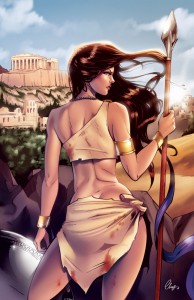 Athena (Minerva) Greek Goddess - Art Picture by chatgr
Athena (Minerva) Greek Goddess - Art Picture by chatgrAthena (Roman equivalent is Minerva) was the goddess who symbolized wisdom. She was also the goddess of war. The Greeks were the first people who achieved logical thinking and formulated global laws for the operation of the universe. It was natural to coin a goddess who personified the wit and wisdom. Besides, even the way of the birth of the goddess was such that testified her properties. The grey-eyed daughter sprang from the head of omnipotent and omniscient Zeus.
The nymphs of the mountain and the Oceanids in Crete, without the knowledge of Cronus, raised Zeus, the father of gods and men. By that time, he chose to fall in love with Metis. She was the most prudent of all her sisters. With her advices, she decisively helped Zeus to get the final victory. She gave Zeus the magical herb, which forced the terrible child-eater Cronus to pull out of his stomach all the gods he had swallowed. Metis was the first wife of Zeus or according to others, the first mistress. At a feast held in Olympus to formalize their relationship, Uranus and Gaia revealed to their grandson that Metis would give him firstly a daughter and then a son who would become so strong, that he would be the first of the gods.
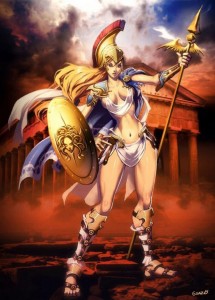 Athena (Minerva) Greek Goddess - Art Picture by GenzoMan
Athena (Minerva) Greek Goddess - Art Picture by GenzoManThe oracle from his ancestors put him into thinking. Therefore, when he saw that Metis was pregnant, he could not settle down. So Zeus asked for an herb from his grandmother Gaia. According to the myth, whoever ate that herb would become as small as the size of a little finger. Gaia did not refuse to the favor he asked and she gave him the herb. Then Zeus ran on Metis and gave it to her to swallow, saying that this herb would help her give birth to strong children. Metis believed him, but shortly after swallowing the herb, she began diminishing. Zeus then opened his huge mouth and swallowed her. He did the same trick as his father, but he quashed both his wife and the child that was in her womb. Once Zeus swallowed Metis, he immediately gained all the wisdom of the world. He knew every moment what was good and what was bad.
After a few days, something began to bother him in his head. He felt like a little sword gently touching his mind. Nevertheless, as time passed the discomfort became more intense and the head ache stronger.
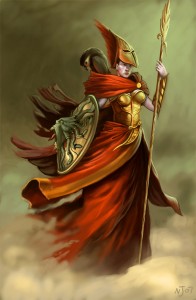 Athena (Minerva) Greek Goddess - Art Picture by TaekwondoNJ
Athena (Minerva) Greek Goddess - Art Picture by TaekwondoNJZeus was in terrible pain. All goddesses tried to soothe him with magic herbs, but nothing seemed to ease the pain. He screamed and knocked on the ground, so that the whole Olympus echoed and trembled by his harrowing voices. One night, Zeus could not bear it anymore and called Hephaestus to come to his palace with his huge hammer. His son arrived sweaty and grimy.
Zeus was in terrible pain. All goddesses tried to soothe him with magic herbs, but nothing seemed to ease the pain. He screamed and knocked on the ground, so that the whole Olympus echoed and trembled by his harrowing voices. One night, Zeus could not bear it anymore and called Hephaestus to come to his palace with his huge hammer. His son arrived sweaty and grimy.
The moment Zeus saw him, he said:
"Quickly Hephaestus, give my head a strike with your hammer in order to save me once and for all from this torment."
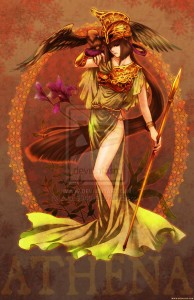 Athena (Minerva) Greek Goddess - Art Picture by zelda994612
Athena (Minerva) Greek Goddess - Art Picture by zelda994612The divine blacksmith paused, rolled his eyes, and refused to do so. However, Zeus was not joking.
Enraged, he threatened Hephaestus that he will throw him for the second time from Olympus.
The terrified young god said:
"Forgive me father, forgive me mother Hera and all you Olympians. But as you also see, I cannot do otherwise."
Shortly after, he picked up his huge hammer and hit it with all his strength at the head of his father. Then in front of the amazed eyes of the Olympians sprang from the head of Zeus a beautiful, fully armored, grey-eyed daughter. She was holding shield, wearing a helmet and waved menacingly a spear. It was Athena, goddess of war but also patroness of wisdom. Athena inherited her father's omnipotence and wisdom of her mother, Metis.
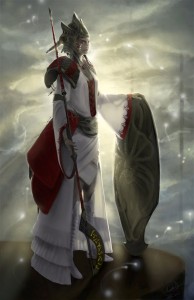 Athena (Minerva) Greek Goddess at sunset - Art Picture
Athena (Minerva) Greek Goddess at sunset - Art PictureAt the time of her birth, Athena took out a war cry that made whole Olympus to tremble and reached to the ends of the world. The earth shook, the sea was agitated, and huge waves rose menacingly. Helios (Sun) stopped his golden chariot and watched the goddess until she pulls off the armor from her weak body. Shortly after, the commotion caused by the birth of the new goddess stopped. The whole nature calmed.
Zeus, relieved by the terrible headaches, saw his new daughter and smiled. Athena, in a short time, grew and gained his divine glory in its entirety. The gods welcomed their new companion with a glorious feast. Athena was the first to start their dance.
According to another myth from Crete, the goddess was born on the island from a cloud that Zeus hit with thunderbolt. Others said that Athena was the daughter of the giant Pallas or daughter of Poseidon and Tritonis. Many times, they called her Pallas. Regarding this name, the following myth exists.
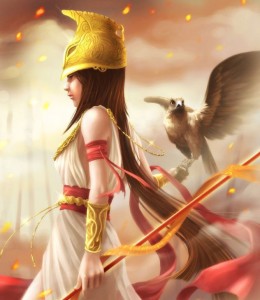 Athena (Minerva) Greek Goddess at dawn - Art Picture
Athena (Minerva) Greek Goddess at dawn - Art PictureThe first years of her life, Athena grew up with a girl called Pallas. They had become very favorite friends. They learned the martial art together and played quite violent games. One day that they quarreled, Pallas was about to strike Athena. However, Zeus seeing the incident was scared for his little daughter and protected her with his Aegis. The girl was startled when he saw lands in front of the terrible shield. The little goddess took advantage of the turmoil and fatally struck her. When Athena realized that her friend had died, she burst into inconsolable crying. To honor her young friend, she created a statue that looked like her and placed it next to her father. She named the statue, which was made of wood, Palladium. Eventually, however, Zeus threw the statue from Mount Olympus and it fell to Troy at the time the Trojans were building the city. Ever since, this statue was protecting the area. Because it had fallen in the temple of Athena, they called the goddess Athena – Pallas.
Many cities in ancient times claimed to have Palladiums and that enjoyed Athena's protection.
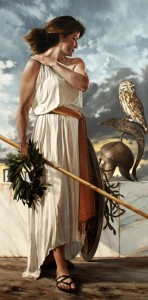 Athena (Minerva) Greek Goddess resting - Art Picture
Athena (Minerva) Greek Goddess resting - Art PictureAthena was the favorite child of Zeus and spent her entire life dedicated to her father, whom she loved and adored. Her help at the Giants' War was valuable, where she killed and skinned the giant Pallas and crashed Sicily upon giant Enceladus, burying him underneath. Only Athena stood beside Zeus when the terrible Typhon (Hurricane) swooped on Olympus. Only once, she participated in the conspiracy of Hera, Poseidon, and Apollo versus her father. Then she was the only one who did not experience the wrath of Zeus and so the love and affection continued without any other problems.
Athena loved martial arts and she was giving herself constantly to them. She had no love affairs and symbolized the eternal virginity. This is why the Athenians called the temple of the goddess on the Acropolis, Parthenon (parthenos in Greek means virgin). Only once Hephaestus tried to annoy her erotically, but the goddess resisted bravely. From the seed of god, which fell to the earth, Erichthonius was born, a celebrated hero of Athens. The goddess was behaving as if he was her son.
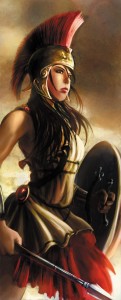 Athena (Minerva) Greek Goddess - Art Picture by Alayna
Athena (Minerva) Greek Goddess - Art Picture by AlaynaOthers claim that the Erichthonius was the son of Gaia who confided him to Athena to raise him. They say that the hero established the Panathenaic festival, the largest festival in honor of Athena. They also believed that the goddess taught him to drive the chariot that is pulled by four horses. Her most favorite city is Athens, which got its name from her.
A myth says that Poseidon was the first to arrive in Attica. He struck with his trident a rock of the Acropolis and immediately gushed forth a spring of salt water. Then Athena that was also claiming the sovereignty and protection of the area planted an olive tree. Then the other Olympians entered as judges to the conflict of the gods and decided in favor of Athena.
According to another myth, an olive tree grew on the Acropolis and a little further gushed a spring. Cecrops was the lord of the area and requested the advice of the oracle. The oracle informed him that the tree represented the Athena and the spring represented Poseidon.
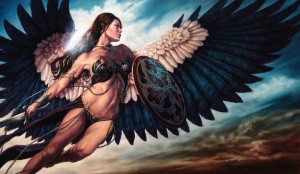 Athena (Minerva) Greek Goddess - Art Picture by Michael C Hayes
Athena (Minerva) Greek Goddess - Art Picture by Michael C HayesThen, Cecrops called a popular assembly of men and women in order to come to a decision. All men voted for Poseidon and all women for Athena. But the women were more than men and so the city was given to Athena. Poseidon was very angry and flooded the area. Men, then, decided to punish women, forbidding them to participate in meetings and vote.
However, the most common version of the myth is the following. The gods told the litigants that the one who would earn the city would be he who made the most useful gift to residents.
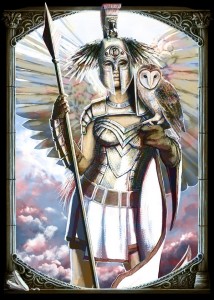 Athena (Minerva) Greek Goddess - Art Picture by Janiceduke
Athena (Minerva) Greek Goddess - Art Picture by JanicedukeThe other gods admired this gift, because they knew how useful it was in agriculture and other professions. Immediately, the wise Athena struck her spear in Attic land and grew a bushy evergreen olive tree. Then the Olympians decided that the fruit of this blessed tree was more useful for the people of the region and thus gave the victory to Athena.
Athena, as a maiden goddess, did not get along with Aphrodite, the patroness of love. Very often, they quarreled and wrangled, even in front of their father, Zeus. He always tried to reconcile them. It seems though that he rarely succeeded. When the two rival goddesses found themselves as opponents in the Trojan War, Athena did not hesitate, through Diomedes of course, to hit Aphrodite and hurt her.
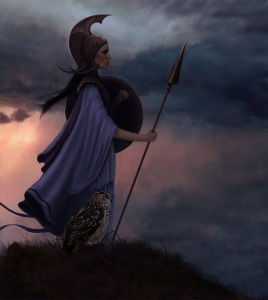 Athena (Minerva) Greek Goddess - Art Picture by J Rickey
Athena (Minerva) Greek Goddess - Art Picture by J RickeyThe martial goddess stood alongside many famous heroes of antiquity. Heracles (Hercules) was one of them that Athena was protecting. Athena saw him for first time, when the mortal hero ran into the side of Zeus to face the Giants. She immediately liked him. With her valuable advices he managed to kill Alcyoneus.
Nevertheless, later also, when Eurystheus assigned to Heracles the test of the twelve labors, Athena also helped him. She gave him the cymbals that were the work of the divine artisan Hephaestus. Hitting the cymbals, the hero startled the Stymphalian hens that flew from their hidden nests and thus killed them with his arrows. In order to delight Athena, Heracles devoted to her the golden apples that he had cut from the garden of Esperides.
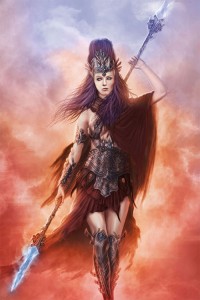 Athena (Minerva) Greek Goddess marching to war - Art Picture
Athena (Minerva) Greek Goddess marching to war - Art PictureWith the help of the goddess, Perseus managed to kill the Gorgon. She was a monster that had snakes instead for hair and her eyes caused terrible panic or petrify anyone who was facing them. The hero, when he went to face the horrible monster, was equipped with the shiny shield that Athena gave him. Therefore, while he had turned his gaze elsewhere, he was watching the Gorgon's image mirrored onto the shield and managed to fight and behead her.
He offered the Gorgon's awesome head to Athena, which was retaining its properties although it was cut off. The goddess placed the head onto the aegis (shield) she had, her father's gift. She collected the blood that popped from the veins of the monster and gave it to Asclepius, who used it as a medicine. Others say that she had given two drops of blood to Erichthonios. One drop was causing death and the other one had therapeutic properties.
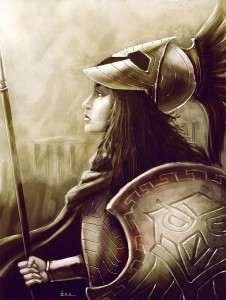 Athena (Minerva) Greek Goddess - Art Picture by Nero tbs
Athena (Minerva) Greek Goddess - Art Picture by Nero tbsA myth says that when Perseus beheaded the Gorgon, her sisters, Stheno (Valence) and Euryale, who were immortal, mourned a lot for her. However, this wailing came from the snakes they had for hair and not by themselves. Athena tried to find a way to imitate this wailing.
Therefore, she took the bone of a large deer they had sacrificed to her, opened some holes and blew rhythmically into the new musical instrument that she called flute. Thrilled, Athena ran to Olympus and showed her invention to the other gods.
However, Hera and Aphrodite ironically broke out in laughter. Athena could not explain their behavior and was very angry. Then they explained her that while playing the flute, her cheeks turned red and big, disfiguring her face and it was very funny. The stubborn goddess ran into a creek and mirrored herself in the waters while playing the flute. Athena immediately understood that the other goddesses were right to mock her and furiously threw her music instrument.
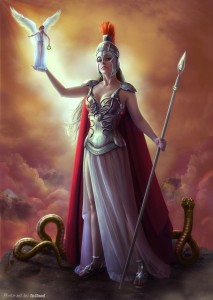 Athena (Minerva) Greek Goddess with Nike - Art Picture by Green Cat
Athena (Minerva) Greek Goddess with Nike - Art Picture by Green CatPegasus, the winged horse, was son of Gorgon and Neptune. A hero, Bellerophon, once asked the help of Athena to capture and tame the horse. One night that the hero slept in her temple, she appeared in his dream and gave him a bridle with which he managed to tame it.
Athena was very shy with men. Therefore, one day that Tiresias saw her nude, bathing in the waters of a lake with the Nymph Chariklo, she avenged him mercilessly. With a simple touch to his eyes blinded him for his entire life. However, her friend begged her to pity him. Since Athena could not cancel a divine decision, decided to favor Tiresias in a different way. She cleaned his ears so well, so he could even hear the chirping of the birds and gave him a stick, which helped him to walk as people who were able to see. Since then, Tiresias became the most famous seer of antiquity.
The martial goddess was active in the Trojan War, where she was protecting the camp of the Greeks, and that because she was outraged by the judgment of Paris regarding the most beautiful goddess.
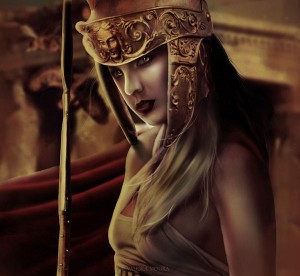 Athena (Minerva) Greek Goddess - Art Picture by Valeskamoura
Athena (Minerva) Greek Goddess - Art Picture by ValeskamouraHer favorite warriors were Diomedes, Achilles and Odysseus. Athena stood by their side in all their difficult moments. Especially, when there was a high risk she resorted to miracles to save them. She made divine fire coming out of the Diomedes‘s helmet and covered the head of Achilles with a fiery cloud. Indeed, in the most difficult moments she transformed herself into a Trojan warrior and went to the concentrations of rival generals, giving them wrong advices.
Nevertheless, when there were divisions and disagreements within the Greek camp, Athena always managed to prevent the worst from coming.
She does not let Achilles slay Agamemnon although he had severely insulted him.
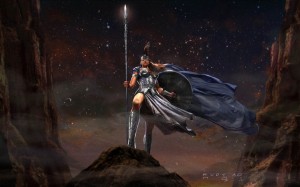 Athena (Minerva) Greek Goddess - Art Picture by Rudyao
Athena (Minerva) Greek Goddess - Art Picture by RudyaoAthena helped Odysseus both during the war and during his ten-year journey of return. In the Odyssey, Athena intervenes with transformations. She takes the form of Mentor and gives valuable advice and guidance to Telemachus.
She also sends dreams. Athena appears in Nausicaa’s sleep and advises her to go to wash her clothes in the river, the day Odysseus was approaching the island of Corfu.
She endows her protégé with supernatural beauty to seduce the princess and accommodate him in the palace of her father.
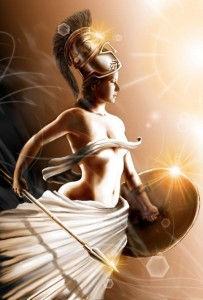 Athena (Minerva) Greek Goddess under sunlight - Art Picture
Athena (Minerva) Greek Goddess under sunlight - Art PictureIn other cases, she rouses Zeus to help Odysseus. With Athena’s intervention, Calypso receives orders to leave the hero free and gives him the means to set sail again into the sea.
Orestes, son of Agamemnon, in order to avenge the murder of his father killed his mother Clytemnestra and her lover Aegisthus. However, Erinyes (Furies), obscure deities who punished the murderers, chased Orestes, who arrived in Athens and took refuge in the temple of the goddess. Then a court took place in the Areopagus (Supreme Court) to judge the young matricide. Athena was the president of the court. The vote ended in a tie, but eventually the court acquitted Orestes because the vote of Athena, which was “Not Guilty”, was counting as double. Since then, there is a law in the court that a tie in the votes counts in favor of the accused.
Athena was protecting all artisans and craftsmen. She was also an amazing weaver. Once, Arachni (Spider), a girl from Lydia, who had gained a great reputation in the art of weaving, called the goddess in a competition.
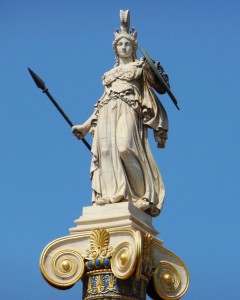 Greek Goddess Athena (Minerva) armored on top of pillar Statue
Greek Goddess Athena (Minerva) armored on top of pillar StatueInitially the goddess appeared to the girl transformed into an old woman and advised her to show modesty. However, Arachni was still cocky and Athena got upset, took her normal form and the contest began. The Pallas portrayed on her woven the daily life of the gods. At the edges, she drew scenes that revealed the debacle of mortals when they did not obey the immortals.
The young woman from Lydia portrayed in her fabric the sex life of the gods and especially their extramarital relationships. Athena did not find any flaw in the work of Arachni, although she spent her entire time examining it. From anger and jealousy, Athena transformed her to the namesake bug that constantly spins and weaves with the tip of her thread.
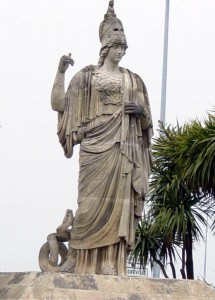 Greek Goddess Athena (Minerva) Statue
Greek Goddess Athena (Minerva) StatueOnce, the goddess had a dispute with Apollo on the art of divination. Thries, the winged nymphs of Parnassus, had taught Athena to foretell the future from the stones that the torrents swept away. However, Apollo complained to Zeus and he decided in favor of his son. Then, the embittered Athena flew the stones in the valley and that area was named Thriassion.
Athena – Pallas symbolize some of the most important ideals of the ancient Greek spirit. She combined strength and bravery with prudence and intelligence. Her favorite symbols were the aegis, the spear, the owl and the olive tree.
Please leave a comment if you liked this article 🙂
All pictures are also uploaded in Albums on the Greek Mythology Pantheon page on Facebook, visit us at :


9 COMMENTS
Hi, I’m an artist from Milan (Italy). I’ m preparing an exhibition which is foculised on the greek gods as seen by Carl Gustav Jung (the greek gods archetypes). I would need 10 pictures of the main greek gods: 5 males (Zeus, Ares, Hermes, Dionisus and Poseidon) and 5 females (Era, Athena, Artemide, Afrodite and Demetra). I’ve been searching a lot on internet but I’ve not actually found all of them painted in the same way (strange but true), I mean with a common style (the better it looks, the more i prefer it). I see that you’re an expert in this field so if you can give me an indication (link or images) to solve my problem I would appreciate it so much. Please let me know if you can do something, otherwisw I’ll keep on searching by myself. Thanx and regards. Massimo.
Hello Massimo,
Can you please look here:
http://doroxdoro.deviantart.com/gallery/12700335/Greek-Gods?rnrd=62102
and tell me if this good for you?
These images are from Stregatto and they are all on the same concept. I find Stregatto an exceptional artist 🙂
foculised? I meant focused, sorry for my bad english 🙂
I’ve written a book called Pan: Pan vs. Echidna, it takes place after the titan and Typhon wars of the Olympians. Pan is born to the god Hermes and a nymph named Dryope, He is raised by nymphs and one day falls in love with a nymph named Syrinx. She is killed by Echidna, a child of Tartarus when she sends her fiends out to attack Arcadia. Pan goes on an adventure in search of Syrinx and into a war with Echidna. This story has a lot of mythical creatures and deities in it. The book is only $2.99 on Amazon Kindle if anyone is interested.
Do you know where the 2nd to last photo of Athena is from (the statue image)? I would like to use it for a project but I need the proper information to cite it.
This is an interesting website,but there’s a mistake on Athena’s discription, she was always called “grey eyed Athena “as if no other gods had that color eyes, and you said they were blue.
Thank you for pointing this to me, you are correct 🙂
I have updated the article.
Thanks a lot for the rich and capturing information and beautiful illustrations. I’d be happy to use one of them (Athena (Minerva) Greek Goddess resting – Art Picture) in a project of mine connected with Minerva, so I’d like to contact the author. Can you help me find the info? Thanks a lot and all the best. Rosa
What was the name of the beautiful singer that sing for the monks during their prayers to the Gods. During the great earth Quack that almost destroyed the Pantheon killed this this beautiful young lady.